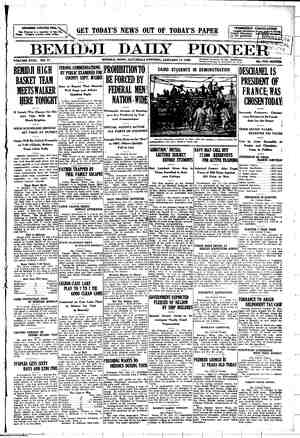New Britain Herald Newspaper, January 17, 1920, Page 10
You have reached the hourly page view limit. Unlock higher limit to our entire archive!
Subscribers enjoy higher page view limit, downloads, and exclusive features.
The Question that should Stir us all to Action ! The Momentous Question and the Logical Answer . with America ? HE signing of the Armistice seemed, at the time, to end skyrocket prices and all our other war troubles. The reaction was immediate and pronounced. For more than a year there has been extravagance which threatens to become a menace. It has been up and up with:prices and with our greater than ever incomes the margin between spending and income has been far too small. For many there has been no margin. To raise the hand of warning, while yet there is time, is sufficient reason for National Thrift Week. But What Is Really Wrong ? Those who should know agree that—1. Demand for commodities the world over exceeds present supply. 2. We are producing too ) little. 3. We are consuming too much in both quantify and quality. As always with these conditions prices are unnecessarily high. Never before and perhaps never again will the whole world be ready to buy at a good price all we can produce. T he advantage of supplying what the World needs is obvious. supply to the outside world what we consume ourselves. Nationally and individually it means added wealth. But we cénqot The Remedy Is individual Thrift. The most abused word in the English language is “Thrift.” Thrift is not miserliness—abject self-denial or solitary confinement from all the joy of living. Thrift is more than the mere saving of money—it is efficiency in your program of life. It is using what you have with care and fore- thought. It is giving one’s best efforts to his or her particular part in life. The reward of thrift is the pride of accomplishment. And the consciousness of a thing well done is the very foundation of human happiness. Today is National Thrift Day or “Bank Day’’ Devoted to emphasizing the service of banks in your Community. Banks protect your money from the dangers of loss, fire, theft, and, even more important still, from the very great temptation to spend carelessly, unwisely and unnecessarily. Those who succeed as savers are mostly those who save before “The Temptation to Spend” has an opportunity to defeat their success. Another great function of banks is the loaning of money. Not all demands for loans meet the requirements of good banking, but generally speak- ing if you now, by a temporary loan, can increase your production of the commodities for which the world is waiting, by all means discuss the matter with your banker. And if you are a producer of the necessities of life the subject is of even greater importance. Of course you must be frank with your banker as it is his duty to his depositors to know to a certainty that your financial arrangements will insure a re-payment of your loan within a reasonable time. Bank loans are always temporary—permanent capital should come from individual investors. On questions of finance your banker is a proper financial advisor. In the pursuit of thrift you will find him a willing and sympathetic counsellor. There are other functions performed by banks of the very greatest importance but not having so clear a connection with Thrift, as for instance the collection of checks, drafts and notes, keeping of valuable papers, supplying currency when and as needed, and the big function of generally stabilizing our whole financial system. A Bank account is a necessary part of your Thrift program—if you have one use it to the fullest extent. Your Bank never objects to frequent deposits although small, because every Banker knows that the regular saving of small accounts is the successful way. If you have no Bank account the first thing to do is to start af once. Let's all begin now to do the sensible thing. Be Thrifty! NEW BRITAIN INDUSTRIAL COUNCIL






